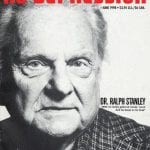Johnny Bush – Horse Opera
ND: Does this seem like a fresh start to you?
JB: Every night does, any more. This has been in the works for two years, and I’m so tickled about this deal.
ND: Don, a lot of your fans, particularly outside Texas, didn’t even discover you until you were past 60. Were you just a late bloomer?
DW: Well, for years I tried to take care of my family and didn’t play music except on weekends. When I retired from the Texas National Guard, I thought I’d try my luck at it. I didn’t care if I failed, because I knew I was going to play somewhere sometime anyway. It wasn’t for money. Still isn’t.
JB: You know what Willie said, ‘Isn’t it nice to get paid for doing something you’d be doing for nothing anyway.’
DW: Somebody said Willie said that when he died he wanted to go out owing around 20 million bucks.
ND: For a while, it looked like he was going to.
JB: That’s how he measures success, if he’s 50 million dollars in debt.
ND: Don, when you were younger, did you give any thought to trying to make your living at music?
DW: I just found out that you’ve got to starve a couple of years, don’t you, Johnny. And I was willing to do it for myself, but I wasn’t willing to do it for my family. I got married at 17.
ND: Johnny, was there ever a time when you thought you weren’t going to be able to sing again?
JB: You bet. When “Whiskey River” was still in the Top Ten, I was touring California when this voice problem happened. At first it affected my speaking voice, not my singing. At the time it happened, they didn’t know what it was. It took them 20 years to put a name to it. Only one in 35,000 people have this problem, it’s so rare. And given the fact that it’s not terminal, they just sweep it under the rug. It’s called spasmodic dysphonia, which means the part of the brain where the voicebox is controlled is in short circuit. There’s two kinds of spasmodic dysphonia. One is when the vocal cords won’t shut at all, and [he whispers] you have to talk like this. The kind that I have is when they slam shut and won’t open.
ND: That has to be the scariest feeling in the world for a singer.
JB: It really is. When they kept telling me there’s nothing physically wrong, I began to think that it’ll pass as quick as it came on. But of course it never did, and it never will.
ND: How have you been able to overcome it to the extent you have?
JB: A lot of prayer, faith and vocal exercises. Sheer determination that I wasn’t going to let it whip me.
ND: Has it changed your style of singing?
JB: No. See, if I recorded something in B-flat, and I now sing it in C, the public doesn’t know that. And I don’t think they care.
ND: Don, this is the first album that you have cut since Sire became involved with Watermelon. I know that Seymour Stein had some ideas on material and Andy Paley was involved in production. Was this a different sort of project than your earlier ones for Watermelon?
DW: Yes, it’s a little different. I still have never made an album yet that I thought was the greatest thing I could ever do.
JB: Somebody asked me last night, “What was your favorite song to record?” And I said, “I haven’t done it yet.”
ND: What sorts of different things did you try?
DW: After we did that Kronos Quartet show at the Bass Concert Hall, I thought it would be real neat to do one with them, and I’m glad we did. And they were trying to get K.D. Lang or Linda Ronstadt to record with me, but they were all so busy. But they got Mandy Barnett, a young girl with a terrific voice, to do a couple tunes with us. And then old Larry Gatlin was in town, and he did some harmonies.




